Dwight Longenecker's Blog, page 338
October 4, 2011
St Francis
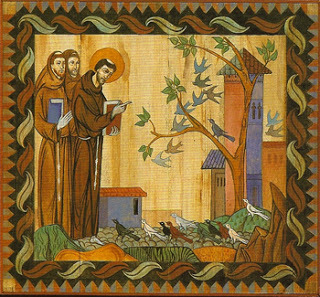
Francis' life is so iconic and symbolic. It happens when that somehow or other with Francis connections are made.
On the pilgrimage I made in 1987 hitch hiking to Jerusalem from England I stopped in Assissi. The place was packed with an international conference of Franciscans. They were all there in the streets like Francis clones dancing and playing guitars and being happy and joyful and all that, but consequently I could not find a place to stay, and wound up in a little pensione--paying more than I should have. Then I lost my wallet. I only had enough money to buy a ticket to Rome where I could contact the bank and cancel my traveler's checks and draw more funds. So in Assissi I was impoverished for a few days. When I got to Rome I had to beg for a room--assuring the sisters at the hostel that I could pay once I was able to draw more money.
In Venice I visited the beautiful ancient Franciscan friary on the island of San Francesco del Deserto, and when I got off the boat and walked up to the monastery a huge German Shepherd like dog bounded up. I was scared. A friar laughed and called him. He was named Gubbio. Geddit?
So in many of the Franciscans I have known--something about the founder lives in them, summed up in the words spoken by one of the Franciscan friars of the renewal who were at St Joseph's Catholic School last spring: "We follow Jesus Christ in the Way of St Francis."
Published on October 04, 2011 10:00
October 3, 2011
Immaculate Mary
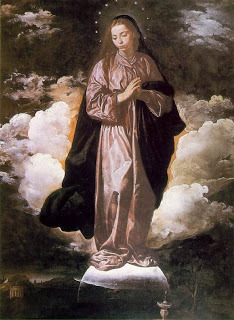
The Dark Lord Shea-uman writes well here about the Immaculate Conception of the Blessed Virgin Mary.
Published on October 03, 2011 14:40
The Rich You Shall Have With You Always
Every summer I take a group of high school students out to work with our partners in El Salvador. The families in the school there live at a simple subsistence level. It's easy to romanticize their lives when we're out there for what amounts to a kind of summer vacation, but there is something simple and honest about their poverty. They don't have much financially. They don't have much hope. They don't have much future. They don't have much of anything. Nevertheless, when I am out there I am always very happy. They welcome us with a natural hospitality and enjoy life in a way that we struggle to in the hectic American suburbs.
Last week the Holy Father called on Catholics to re-examine our attitude to wealth. When I'm back in the United States I spend most of my time working not with the poor, but with the rich, and even when I am working with the poor in prison, or in the parish or in our food pantry, I'm aware that being 'poor' in America is very different from being poor anywhere else, and being rich in America is very different from being rich anywhere else.
When working with the rich there are certain pitfalls that are very hard to avoid. The first one is knowing how to be their pastor. They have money and you need money. You need money to build a church, to subsidize your school, to start a ministry to the poor, to establish a new method of evangelization, to start a radio show. You not only need the rich to help you do this, but many of them are often good, sincere and worthy Catholic people. The thing is, they're rich and being rich they are used to getting their own way. They are used to people kow towing to them and being subservient. They are used to being 'benefactors' with all the loaded relationships and expectations that involves. Too often, therefore, we compromise with these people of power in order to get their donations to do the work we feel called to do. Tricky.
This is one of the reasons why a pastor should take seriously his obligation in canon law to live in apostolic simplicity. If I live in apostolic simplicity nobody can buy me. I can't be fired. I can't be hired. I can't be influenced by the wealth and power of the worldly wise. If I have the freedom of a St Francis, then I also have the freedom to love the rich as I would love the poor--seeing them for who they really are--without the glossy coat and charming smile and glittering manners that the wealthy can afford. I can see them exactly for who they are--all their good traits and all their faults, and by God's grace I can love them for who they are, not what they have.
The second pitfall in working with the rich is that it is very difficult not to be influenced by their assumed set of values. People who are rich dwell in wealth. They breathe the air of affluence. They have an attitude of power and privilege and position which is simply part of having wealth. This is not to say that they are all vain, power hungry, greedy and obnoxious people--not at all. It is simply to say that around them is an aura of confidence and power that goes with being able to buy pretty much whatever they want. This feels good, and soon that sense of power translates into a set of values and a way of life which naturally protects and defends the privilege and power. When working with such people it is difficult not to assume that same attitude and set of values. It's hard to be poor in heart when you're rich in pocket.
The third problem with the rich is that it is very difficult for them to know their need of God. Wealth dulls our desire for God. If we can buy everything we need, why call on God? Consequently, when the rich are also religious what results is a warped sense of the Christian faith. For too many of the wealthy the Christian faith is reduced to (at best) a set of moral principles and 'rules for good behavior', and at worst, an act of cultural conformity--a weekend past time for respectable people. The idea of living a radical life of obedience and sacrifice for the kingdom of God is well...(polite smile) rather extremist.
The fourth problem is the result of the first three: that the wealthy end up with a blind spot regarding the real values and beliefs of the faith. They may live their lives in a beautiful haze of 'goodness' and material blessings and nice friends and lovely things and wind up with a blank in understanding the heart of the gospel.
How do we get over or around it? We can't. The rich, like the poor, we will have with us always.
But in saying all this, I do not wish to be too harsh. Some of the genuinely best, most gentle, loving, kind and genuine Christian souls I have known have been very wealthy. They have been humble, generous, caring and content with little. They have been good stewards of the riches they have either earned or been given and the responsibility has made them wise.
This brings us to the heart of the matter--material wealth, or lack of it--is secondary. What matters is what you do with it, and what you do with it depends on your relationship with the one who was rich, and yet for our sake became poor and took on the status of a slave.

Last week the Holy Father called on Catholics to re-examine our attitude to wealth. When I'm back in the United States I spend most of my time working not with the poor, but with the rich, and even when I am working with the poor in prison, or in the parish or in our food pantry, I'm aware that being 'poor' in America is very different from being poor anywhere else, and being rich in America is very different from being rich anywhere else.
When working with the rich there are certain pitfalls that are very hard to avoid. The first one is knowing how to be their pastor. They have money and you need money. You need money to build a church, to subsidize your school, to start a ministry to the poor, to establish a new method of evangelization, to start a radio show. You not only need the rich to help you do this, but many of them are often good, sincere and worthy Catholic people. The thing is, they're rich and being rich they are used to getting their own way. They are used to people kow towing to them and being subservient. They are used to being 'benefactors' with all the loaded relationships and expectations that involves. Too often, therefore, we compromise with these people of power in order to get their donations to do the work we feel called to do. Tricky.
This is one of the reasons why a pastor should take seriously his obligation in canon law to live in apostolic simplicity. If I live in apostolic simplicity nobody can buy me. I can't be fired. I can't be hired. I can't be influenced by the wealth and power of the worldly wise. If I have the freedom of a St Francis, then I also have the freedom to love the rich as I would love the poor--seeing them for who they really are--without the glossy coat and charming smile and glittering manners that the wealthy can afford. I can see them exactly for who they are--all their good traits and all their faults, and by God's grace I can love them for who they are, not what they have.
The second pitfall in working with the rich is that it is very difficult not to be influenced by their assumed set of values. People who are rich dwell in wealth. They breathe the air of affluence. They have an attitude of power and privilege and position which is simply part of having wealth. This is not to say that they are all vain, power hungry, greedy and obnoxious people--not at all. It is simply to say that around them is an aura of confidence and power that goes with being able to buy pretty much whatever they want. This feels good, and soon that sense of power translates into a set of values and a way of life which naturally protects and defends the privilege and power. When working with such people it is difficult not to assume that same attitude and set of values. It's hard to be poor in heart when you're rich in pocket.
The third problem with the rich is that it is very difficult for them to know their need of God. Wealth dulls our desire for God. If we can buy everything we need, why call on God? Consequently, when the rich are also religious what results is a warped sense of the Christian faith. For too many of the wealthy the Christian faith is reduced to (at best) a set of moral principles and 'rules for good behavior', and at worst, an act of cultural conformity--a weekend past time for respectable people. The idea of living a radical life of obedience and sacrifice for the kingdom of God is well...(polite smile) rather extremist.
The fourth problem is the result of the first three: that the wealthy end up with a blind spot regarding the real values and beliefs of the faith. They may live their lives in a beautiful haze of 'goodness' and material blessings and nice friends and lovely things and wind up with a blank in understanding the heart of the gospel.
How do we get over or around it? We can't. The rich, like the poor, we will have with us always.
But in saying all this, I do not wish to be too harsh. Some of the genuinely best, most gentle, loving, kind and genuine Christian souls I have known have been very wealthy. They have been humble, generous, caring and content with little. They have been good stewards of the riches they have either earned or been given and the responsibility has made them wise.
This brings us to the heart of the matter--material wealth, or lack of it--is secondary. What matters is what you do with it, and what you do with it depends on your relationship with the one who was rich, and yet for our sake became poor and took on the status of a slave.
Published on October 03, 2011 09:28
Teepees and Tabernacles

Go here to read my latest piece for Crisis Magazine. The article is about church architecture and mentions the new church we are building at Our Lady of the Rosary parish which has been designed by Andrew Gould. Drawings and plans have been under wraps while in development, but next weekend we launch our capital campaign with fantastic watercolor renderings by Matthew Alderman. Stay tuned for news about this exciting project here.
Published on October 03, 2011 04:17
October 2, 2011
Greenville Pro Life Chain
It was the annual pro life chain in Greenville this afternoon.
Our Lady of the Rosary Parish had a great turnout

Fr Longenecker won the cool Catholic hat competition
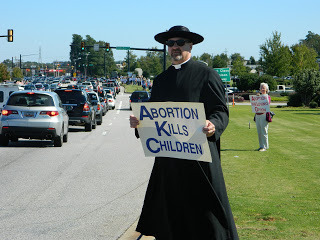
Theo and Elias Longenecker were there

and so was Maddy, who is a senior at St Joseph's Catholic School


Our Lady of the Rosary Parish had a great turnout

Fr Longenecker won the cool Catholic hat competition

Theo and Elias Longenecker were there

and so was Maddy, who is a senior at St Joseph's Catholic School

Published on October 02, 2011 14:24
Guardian Angel Story
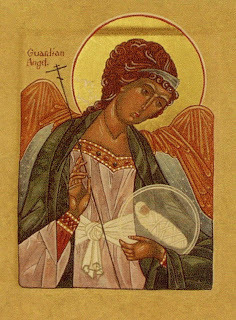
My parents were driving home from the youth club they ran every week. It was late and they were making their way down the country lanes of rural Pennsylvania. I was asleep in the back of the station wagon with my older brother and sister--all of us little children.
My Dad said as they came over the brow of the hill they saw in the distance another car coming at high speed directly in the oncoming direction. The country lane was only wide enough for one car. There were steep banks on either side, and they knew that as they went down into the dip the oncoming driver would not be able to see them.
There was no place to turn. There was no space to get over to let him pass. All of this happened in a split second. Sure enough, the car came over the hill and my mother and father, sitting up front, said later that they braced themselves for the impact. They even saw the shocked and terrified face of the other driver as he prepared to crash into them head on at high speed.
Next thing they knew they were looking out the back window of the car at his fast receding tail lights. There was no way he could have got around them. There was simply no space for two cars. Instead, one car passed through the other, and went on its way. The laws of physics as we understand them were suspended for a moment and we were delivered.
Believe in miracles.
Published on October 02, 2011 08:25
October 1, 2011
Being Little
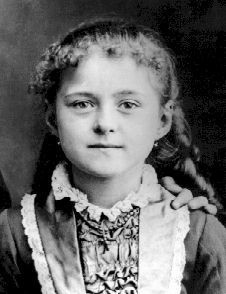
Someone referred to me the other day as "larger than life." I'm not quite sure if it was a compliment. I think what they meant was that I charge around on one of my many projects and woe betide anyone who happens to be in my way. Either that or they were saying in a nice way that I'm an arrogant, self centered know it all. I suppose it's true. I've often been accused of being arrogant or aloof, when all I thought I was doing was minding my own business.
Either way, I think it would be better to be "smaller than life" than "larger than life". Being truly little is the way of St Therese and St Benedict. See that little girl? She is showing you the way to Jesus, for he says, "Unless you become as a little child you cannot enter the kingdom." The door is little and low and the sign on the door says, "No grown ups allowed."
However, what does it mean to be "little"? It means to be truly and completely oneself. Humility mustn't be confused with obsequiousness or abject servility. If we have a personality which is naturally a 'behind the scenes' type of person, then when we're in a supporting role we're being humble and seem humble, but if we are naturally a leader, and individualist or creative person it may be false humility to constantly put ourselves in a background role.
The heart of being little is service to others, and we serve others best by being totally ourselves--transformed by grace to become fully ourselves. This is what St Therese did. She became a saint not by becoming someone else, but by becoming fully herself, and we do not become saints by trying to be totally like St Therese, but be being totally who God made us to be.
This is why it is so delightful that St Jerome and St Therese and St Francis are all celebrated within the same week. Three utterly different saints could not be imagined, and yet all three made holy by God. Each one pursued the path of becoming little through their own set of circumstances, their own path of obedience and their own cross of suffering.
Likewise with us. If we take our faith seriously, then we will have to become little. Notice that the gospel does not say we 'may' become little as if that is just one of the ways to heaven. It says that we 'must' become as little children, and that hurts. We want to be powerful grown ups. It hurts to become little, but it is the pain of the Almighty Sculptor chiseling away at the stone block that is our heart--bit by bit chipping away everything that does not look like a saint. Through the circumstances of our lives, through our joys and sorrows and hopes and fears the work is being done if we allow, the work that will make us into 'Christians--little Christs'--each of us an image of the image of the unseen God.
Published on October 01, 2011 08:07
Meeting Therese
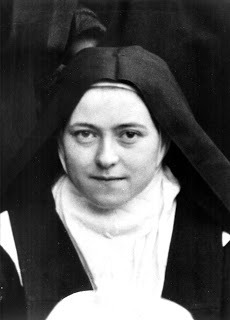
From my book, St Benedict and St Therese--The Little Rule and the Little Way.
At the beginning of my journey to Jerusalem I had stopped in the Northern French town of Lisieux simply because I had heard of Thérèse of Lisieux and the map said, 'pilgrimage centre'. As an Anglican convert from American fundamentalism I knew next to nothing about Saint Thérèse of Lisieux . I'd read snippets about 'the little flower' and concluded that the simpering little girl who said a rosary bead every time she went up the stairs was not really to my taste. The first impressions of Lisieux did little to straighten my wrinkled nose. The road up to the ugly basilica was crammed with souvenir shops clattering with dangling rosaries, holy pictures, and lots of Thérèseian tat and papal paraphernalia. Inside the huge church I was turned off by people lighting candles in front of an arm bone of the saint. There was more to come. In the convent church a figure of Saint Thérèse lies in a glass coffin surrounded with roses like a prop from a Disney film. Near the convent I went into a darkened side room and saw her hair, her habit and her writing desk. It seemed all too much like a visit to a wax museum.
I was beginning to be interested in this little saint, but I was still repulsed by a devotion which seemed both alien and tasteless. As an American I thought the French should know better. Nevertheless, I took a room in the Hermitage—a pilgrim's hostel next to the Carmel where the saint lived and died. That summer evening I went to bed with the window open. I woke up at about three in the morning. The moon was full and a light breeze was blowing the net curtains at the open window. I was immediately wide awake and aware of a 'presence' in my room. The presence seemed to be female and extraordinarily joyful. I am not one for waking dreams and have never had a vision, but I sat up in the bed acutely aware that I was being introduced to something or someone good. I got the impression that the positive presence was that of the saint herself. I sat awake, curious and alert for about a quarter of an hour before the feeling faded and I went back to sleep.
The next morning, remembering my revenant, I visited the book shop, bought Michael Hollings' biography of Saint Thérèse and read it on my journey. I was doubtful about my night-time experience and put it down to a vivid imagination. However the experience was disturbing enough to make me remain open minded about the whole business. As I read, my feelings about Thérèse went from sceptically negative to grudgingly positive. I concluded that as usual, if so many people thought she was great it must be me who had got it wrong. By the time I got to the end of the book Thérèse's brilliant spirit had begun to win me over. When I discovered that she prayed for priests I wondered if I had indeed met her on that summer midnight, and stopped to ask if she might pray for me too, even if I was not a full member of her family.
Published on October 01, 2011 07:31
September 30, 2011
St Jerome
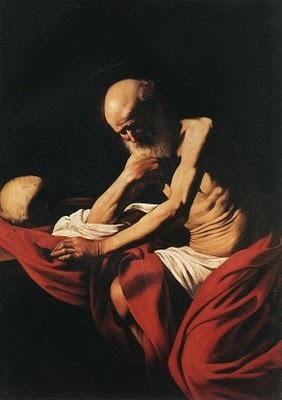
See how Caravaggio captures the wonder of grace working through the frail humanity of this great saint. Knowing how unkind and harsh he has been to others, Jerome is seen as introspective. He is not portrayed in some ecstasy of mystical rapture, but in the pondering of self doubt. So he puts himself through the great sufferings of asceticism--always keeping before him the skull as the memento mori the symbol of his own mortality. This is the what the saintly soul suffers who is arrogant and harsh to others. He sees how he has hurt them. He sees his pride and he punishes himself in hidden and unseen ways to do penance for his pride.
So beautiful Jerome--so harsh and such a fighter--retires to his cave in Bethlehem to spend a life contemplating the incarnation of our Lord. Does he lash out against the sin and ignorance and foolishness of people? Perhaps, but perhaps he also lashes out secretly against himself--blaming himself for a lack of charity--a lack of compassion. Who knows his inner torment in the self realization that he is not 'a nice person'? Who knows his own suffering in the realization that he has made enemies when he should have made friends? Who knows the self doubt and torment he feels when those who should be his brothers rise up against him? Who knows the burden of his great intellect and learning? He has only pursued his own natural gifts to their natural end, and all his learning and wisdom has only seemed to bring him isolation and misunderstanding.
Do you see how the grace of God works within the human frailty to bring a soul to perfection? This is the true wonder of the saints--that they are not all simpering, pious souls. They are not all beautiful souls who preach to the birds and kiss lepers. They are not all quiet, submissive and delicate flowers who love Jesus and Mary with a pure and unsoiled heart. No. Many are difficult and troublesome souls who God also touches and brings home to glory.
And I don't know about you, but a saint like Jerome, who seems so flawed, actually gives me much more joy and hope and zeal than some plaster saint with a canned hagiography and a pious simpering band of devotees.
Published on September 30, 2011 16:22
Jerome and Jeremiah
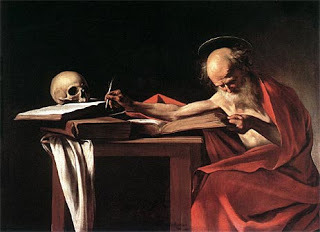
You can put St Jerome down as patron saint of curmudgeons. This guy was one controversialist! Donald Attwater's Dictionary of Saints says, " St Jerome was in some ways a contradictory character. His religious ideals where pitched very high; he held the affection of his friends and followers; he was considerate to the weak and lowly. On the other hand there were his intemperateness in controversy, his contempt for opponents, the virulence of his tongue and pen, and his savage in insulting invective...the remark attributed to Pope Sixtus V seems more to the point: looking at a picture which showed Jerome beating his breast with a stone, Sixtus said "You do well to use that stone without it you would never have been numbered among the saints."
I think I understand Jerome. You see, he was a very smart and educated guy. He considered life to be a mystery to be understood, and through his learning and education he figured it out, and then he had a passion to share that understanding with others, but when they wouldn't agree with him, or when they said something ignorant or stupid or behaved in an ignorant or stupid way he lost his patience. He felt he had to correct them and put them right all the time, and when they were too thick or stubborn to respond he just hit harder instead of backing off.
We all know folks like that. I see one in the mirror most mornings. What's good about them? Well, to tell the truth, they very often tell the truth. In other words, they are straight talkers. They don't mind telling it like it is. If you don't like it--tough. They cut through all the sentimentality and lies. They cut through the hypocrisy and cant and pretense. They understand how often the sentimentality and lies and power games and hypocrisy are all wrapped up in sweetness and light and smiles and those sincerely pained pious looks we all know which are imbued with self righteousness and that twisted sort of spiritual pride.
St Jerome was well named. Not too far off Jeremiah who also inveighed against his enemies in uncompromising terms, but another good thing about such prophetic figures is that they are passionate for the truth. They are passionate for God and passionate for the salvation of souls.
Published on September 30, 2011 10:03
Dwight Longenecker's Blog
- Dwight Longenecker's profile
- 80 followers
Dwight Longenecker isn't a Goodreads Author
(yet),
but they
do have a blog,
so here are some recent posts imported from
their feed.



